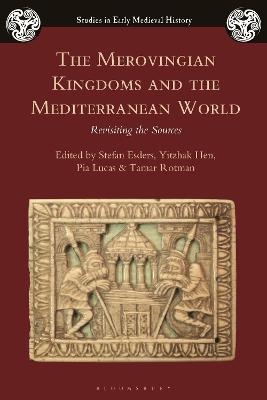
The Merovingian Kingdoms and the Mediterranean World
Bloomsbury Publishing PLC (Verlag)
978-1-5266-2968-5 (ISBN)
The papers collected here provide new insights into the history of the Merovingian kingdoms by examining various relevant issues, ranging from identity formation to the shape and rules of diplomatic relations, cultural transformation, as well as voiced attitudes towards the “other”. Each of the papers begins with a short excerpt from a primary source, which serves as a stimulus for the discussion of broader issues. The various sources’ point of view and their contextualization stand at the heart of the analysis, thus ensuring that discussions are accessible to students and non-specialists, without jeopardizing the high academic standard of the debate.
Stefan Esders is Professor of History of Late Antiquity and the Early Middle Ages at the Friedrich-Meinecke-Institut, Freie Universität Berlin, Germany. Yitzhak Hen is Professor of Late Antique and Early Medieval History, Department of History at The Hebrew University of Jerusalem and the Director of the Israel Institute for Advanced Studies, Israel. Pia Lucas is a doctoral candidate and research assistant at the Friedrich-Meinecke-Institut, Freie Universität Berlin, Germany. Tamar Rotman is a post-doctoral fellow in the Department of General History at Bar Ilan University and a research assistant in the Israeli Science Foundation project “Through distant eyes: the birth of a Merovingian story, 575-1575”, Israel.
Acknowledgements
List of Contributors
List of Abbreviations
Maps
Introduction, Pia Lucas and Tamar Rotman
Part 1: The wider world: Setting the context of the post-Roman world
1. History, geography and the notion of mare nostrum in the early medieval West
Yitzhak Hen
2. True differences: Gregory of Tours’ account of the Council of Mâcon (585)
Helmut Reimitz
Part 2: Mediterranean ties and Merovingian diplomacy
3. East and West from a Visigothic perspective: How and why were Frankish brides negotiated in the late sixth century
Anna Gehler-Rachunek
4. Friendship and diplomacy in the Histories of Gregory of Tours
Hope Williard
5. Private records of official diplomacy: The Franco-Byzantine letters in the Austrasian Epistolar Collection
Bruno Dumezil
6. The language of sixth-century Frankish diplomacy
Yaniv Fox
Part 3: Bridging the Seas: Law and religion
7. Mediterranean Homesick Blues: Human trafficking in the Merovingian leges
Lukas Bothe
8. The Fifth Council of Orléans and the reception of the Three Chapters controversy in Merovingian Gaul
Till Stüber
9. Reconciling disturbed sacred space: The ordo for “reconciling an altar where a murder has been committed” in the Sacramentary of Gellone in its cultural context.
Rob Meens
10. Imitation and rejection of Eastern practices in Merovingian Gaul: Gregory of Tours and Vulfilaic the Stylite of Trier
Tamar Rotman
Part 4: Shifting Perspectives: Emperors, tributes and propaganda
11. Magnus et verus christianus: The portrayal of Emperor Tiberius II in Gregory of Tours
Pia Lucas
12. When contemporary history is caught up by the immediate present: Fredegar’s proleptic depiction of Emperor Constans II
Stefan Esders
13. Byzantium, the Merovingians, and the hog: A passage of Theophanes’ Chronicle revisited
Federico Montinaro
Conclusion, Yitzhak Hen and Stefan Esders
Index
| Erscheinungsdatum | 19.11.2021 |
|---|---|
| Reihe/Serie | Studies in Early Medieval History |
| Zusatzinfo | 2 bw illus |
| Verlagsort | London |
| Sprache | englisch |
| Maße | 156 x 234 mm |
| Themenwelt | Geschichte ► Allgemeine Geschichte ► Mittelalter |
| Geisteswissenschaften ► Geschichte ► Regional- / Ländergeschichte | |
| Geschichte ► Teilgebiete der Geschichte ► Kulturgeschichte | |
| ISBN-10 | 1-5266-2968-2 / 1526629682 |
| ISBN-13 | 978-1-5266-2968-5 / 9781526629685 |
| Zustand | Neuware |
| Haben Sie eine Frage zum Produkt? |
aus dem Bereich


